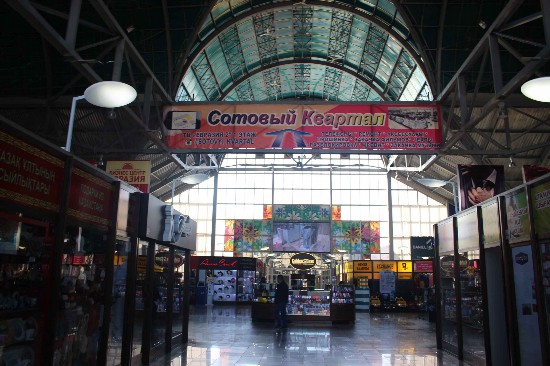


Clothes, electric appliances, and groceries, all imported from China, are sold in the Eurasia Shopping Mall of Astana, Kazakhstan. (Photo/Global Times)
On Sept. 7, 2018, the "Belt and Road" China-Kazakhstan Forum on Think Tank, Media and Cultural Communication opened in Kazakhstan's capital city, Astana. Key representatives from political, business and academic circles of China and Kazakhstan attended the forum and exchanged ideas on how the Belt and Road has changed Kazakhstan, Global Times reported.
Held by Huanqiu.com together with the China Public Diplomacy Association, the forum began on the five year anniversary of Chinese President Xi Jinping's first proposal to build the “Silk Road Economic Belt” in Astana.
The Belt and Road Initiative has granted cooperation between China and Central Asian countries with new vigor, creating new ties between Kazakhstan and Eurasia, said Erlan Karin, chairman of the Kazakhstan Council for International Relations at the forum.
While at the forum, Hu Zhengyue, Vice President of the China Public Diplomacy Association, declared that the Belt and Road Initiative is a brand new undertaking of international cooperation, and as long as countries work together they will achieve win-win results.
“The Belt and Road can create more than 200,000 jobs for countries involved, which means more opportunities and choices. Chinese fever is on the rise in Kazakhstan, and there are now over 14,000 students from Kazakhstan studying in China,” Kuanysh Sultanov revealed in an interview with Global Times.
According to the Chinese Embassy in Kazakhstan, China is Kazakhstan’s second largest trade partner, the second largest exports market, the second largest source of imports and most significant source of business loans.
Statistics from the Chinese Embassy in Kazakhstan indicate that to date, bilateral trade between China and Kazakhstan has amounted to near $100 billion, while Chinese institutions have provided Kazakhstan with more than $50 billion in loans.
China-Europe freight trains have passed through the territory of Kazakhstan more than 1,800 times, a 50 percent rise since 2016. The value of the shipments dispatched from the China-Kazakhstan section reached $120 million.
Additionally, the two countries have mutually established five Confucius Institutes and five Kazakhstan Language and Cultural Centers, and have carried out cooperation in areas including local currency settlement and currency swap.
Such intensive exchanges were impossible five years ago. In an interview with Global Times, a professor of L.N. Gumilyov Eurasian National University said that after the Ukrainian crisis at the end of 2013, Kazakhstan’s economic development declined quickly, but now the Belt and Road Initiative has revitalized the once-troubled country.
 Fire brigade in Shanghai holds group wedding
Fire brigade in Shanghai holds group wedding Tourists enjoy ice sculptures in Datan Town, north China
Tourists enjoy ice sculptures in Datan Town, north China Sunset scenery of Dayan Pagoda in Xi'an
Sunset scenery of Dayan Pagoda in Xi'an Tourists have fun at scenic spot in Nanlong Town, NW China
Tourists have fun at scenic spot in Nanlong Town, NW China Harbin attracts tourists by making best use of ice in winter
Harbin attracts tourists by making best use of ice in winter In pics: FIS Alpine Ski Women's World Cup Slalom
In pics: FIS Alpine Ski Women's World Cup Slalom Black-necked cranes rest at reservoir in Lhunzhub County, Lhasa
Black-necked cranes rest at reservoir in Lhunzhub County, Lhasa China's FAST telescope will be available to foreign scientists in April
China's FAST telescope will be available to foreign scientists in April "She power" plays indispensable role in poverty alleviation
"She power" plays indispensable role in poverty alleviation Top 10 world news events of People's Daily in 2020
Top 10 world news events of People's Daily in 2020 Top 10 China news events of People's Daily in 2020
Top 10 China news events of People's Daily in 2020 Top 10 media buzzwords of 2020
Top 10 media buzzwords of 2020 Year-ender:10 major tourism stories of 2020
Year-ender:10 major tourism stories of 2020 No interference in Venezuelan issues
No interference in Venezuelan issues
 Biz prepares for trade spat
Biz prepares for trade spat
 Broadcasting Continent
Broadcasting Continent Australia wins Chinese CEOs as US loses
Australia wins Chinese CEOs as US loses